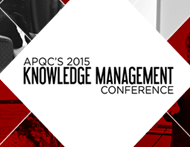
“Companies need to learn faster,” said APQC leader Carla O’Dell in her keynote address at the organization’s 20th Annual KM Conference, and #apqckmconf lit up on Twitter. She also said that search is a key component of the KM strategies that will help this happen.
What a great lead-in to the Coveo & customers panel discussion on upskilling via search a little later! This session focused on – why is search important? Is it because…as many people think…it makes stuff we know about easier to find? Not really. While that is a common use for search that makes people more efficient – helping people upskill at the moment of need, in the flow of work, requires more. It requires that people discover information they didn’t know existed. This makes them more proficient. Making use of the entire IT ecosystem of record and injecting only relevant content and experts, via search, helps people upskill in the flow of work. And it is how our digital natives and digital literates want to learn. A recent study from Bersin by Deloitte showed that 70 percent of workers reported learning via search vs 50 percent via traditional training programs.
As our companies are becoming digital workplaces this is no longer a nice-to-have. It is essential, just as learning faster is essential. In our APQC session I shared the results of the 2015 Gartner CEO Survey, which, just like the 2014 CEO survey, shows that CEOs rank talent/skills as the primary constraint to growth and strategic change. Two years running. For the first time in 2015, CEOs also revealed that technology has become a stronger priority than in any year since the survey started. It is second only to growth, and ahead of workforce and customers. Clearly CEOs know digitalization means change, and the future is now.
The topic of our session was How Upskilling Employees and Customers Impacts the Bottom Line, and this topic was also reflected in Carla’s opening keynote, where she exhorted KM practitioners to “focus where the money is” in order to prove the value. Our two Coveo customer speakers proved that they had done exactly that. Sheila Boudreau, Senior Director, Customer Care with Deltek, talked about how upskilling customers via search on their secure portal helped Deltek to increase case deflection and also reduce case flow. On top of that, she related that when customers do call, they are much more educated on their issue, better able to describe what is happening, thanks to their experience with search on the portal. A case deflected is a direct impact on the bottom line.
Randy Norton, Business Unit Director with Tokyo Electron America, related how field service engineers were able to reduce mean time to repair, which can mean millions for their customers. When these big semi-conductor producing machines go down, production screeches to a halt and costs customers upwards of a million per day. Helping to upskills Field Service Agents when they are in the field, via mobile devices, enables them to upskill as they are working and solve challenges faster. Randy also related that search enables new FSEs to come up to speed faster.
I was honored by being selected for a video interview following our session. Evidently APQC polls its attendees on the most-wanted sessions to watch, and interviews the speakers. We’ll be sure to share the interview on this blog when it’s ready to go.
Thanks to our customers Sheila and Randy for making it happen, and to the great audience at APQC who contributed their questions and comments to the session. #APQCKMCONFrocks!

